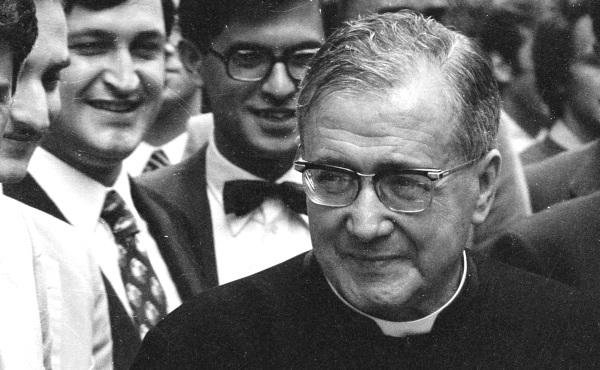On this new feast of Saint Josemaría, the anniversary of his departure to Heaven, we first of all thank God for allowing us to celebrate it with a certain normality in these circumstances. Exactly one year ago, only a few people were able to attend the Mass celebrated in Our Lady of Peace (the prelatic church), which was offered for those who had died during the pandemic. Today we pray once again for all the deceased and the sick, together with their families, and we go to the intercession of Saint Josemaría to protect them from Heaven.
In the first reading we heard the account of the creation of man. God formed man from the dust of the earth, and then created the world for him and for all his descendants to till and care for it. Saint Josemaría stressed that work is a mission “entrusted to us here on this earth … to make us sharers in God’s creative power. It enables us to earn our living and, at the same time, to reap ‘the fruits of eternal life,’ for ‘man is born to work as the birds are born to fly’” (Friends of God, 57).
Jesus himself spent most of his earthly life working alongside Joseph. So much so that, when he began his public life, the local people knew him by his trade: “Is not this the carpenter, the son of Mary?” (Mk 6:3). His work didn’t cause surprise, as would later happen with his miracles and preaching. His days in the workshop help us understand that holiness is also built there: in the tools of one's trade, in the desire to serve and care for those around us, in the midst of the joy and fatigue that, in one way or another, are never lacking.
Confronting work in this way helps us to see it not only as a merely material reality, but as a response to the vocation that God has given to each of us and that encompasses our entire existence. As Pope Francis said: in work “many aspects of life enter into play: creativity, planning for the future, developing our talents, living out our values, relating to others, giving glory to God” (Laudato si', 127).
In the second reading, Saint Paul speaks about the spirit that should imbue our relationship with God: “You did not receive the spirit of slavery ... but you have received the Spirit of adoption as sons, by whom we cry ‘Abba! Father!” (Rom 8:15).
It is precisely the awareness of our divine filiation that enables us to live without fear: “I am not afraid of anything or anyone, not even God, who is my Father,” Saint Josemaría said. This reality leads us to face every difficulty with serenity and without discouragement, especially on realizing our own limitations and mistakes and those of others, because with divine grace we always have the light and strength needed to transform them into a path to holiness. With filial trust in God, we can abandon ourselves in his arms, without relying only on our own strength.
This filial abandonment was the foundation of Saint Josemaría’s spiritual life. He saw himself as a faltering child, who had to begin and begin again each day. This intimacy with his Father God shone forth especially in prayer.
In the Gospel, we heard Jesus’ invitation to the Apostles to “put out into the deep.” And we see Simon Peter’s reluctance as the result of the previous night’s failure: “Master, we toiled all night and took nothing!” (Lk 5:5). And yet he responds right away: “But at your word I will let down the nets” (Lk 5:5). He still didn’t know Jesus well, but that didn’t stop Simon Peter from trusting Him and mistrusting his own strength, without thinking about what humanly made more sense. The result dispelled all his doubts: “They caught a large number of fish, and their nets were breaking” (Lk 5:6).
Today too Jesus calls us to embark on an apostolate that does not admit any fear, because we know that He, the Lord, is guiding our boat. During this time marked by the pandemic, it is true that we have encountered difficulties that have limited our apostolic action. Limited but not stopped it, since for a Christian everything can be turned into apostolate, as we have learned from Saint Josemaría.
In fact, during these long months many apostolic initiatives have been undertaken with zeal, creativity and perseverance. In this moment when the world has a special need for God, we have to commit ourselves to helping the people around us understand, with our sincere friendship, what it means to live close to Jesus. Our Lord will ensure that the effectiveness of our work is as great as the miraculous catch.
Let us go to our Lady’s motherly intercession, with the simplicity and trust that we saw in Saint Josemaría. On one occasion he confided to a group of his children: “I am abandoning myself; I am trying to make myself small and place myself in the arms of our Lady” (Preaching Notes, 20 December 1974).
